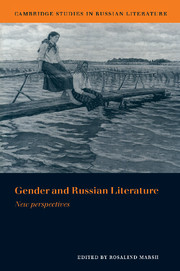Book contents
- Frontmatter
- Contents
- Notes on contributors
- Acknowledgements
- 1 Introduction: new perspectives on women and gender in Russian literature
- PART I HISTORICAL AND BIOGRAPHICAL PERSPECTIVES
- 2 Women in seventeenth-century Russian literature
- 3 Conflicts over gender and status in early nineteenth-century Russian literature: the case of Anna Bunina and her poem Padenie Faetona
- 4 Reading the future: women and fortune-telling in Russia (1770–1840)
- 5 Russian women writers of the nineteenth century
- 6 The ‘woman question’ of the 1860s, and the ambiguity of the ‘learned woman’
- 7 Carving out a career: women prose writers, 1885–1917, the biographical background
- 8 The fate of women writers in literature at the beginning of the twentieth century: ‘A. Mirè’, Anna Mar, Lidiia Zinov′eva-Annibal
- 9 Lidiia Zinov′eva-Annibal's The Singing Ass: a woman's view of men and Eros
- 10 Anastasiia Verbitskaia reconsidered
- 11 Soviet woman of the 1980s: self-portrait in poetry
- PART II THE PERSPECTIVE OF LITERARY CRITICISM
- Index
- CAMBRIDGE STUDIES IN RUSSIAN LITERATURE
5 - Russian women writers of the nineteenth century
Published online by Cambridge University Press: 06 July 2010
- Frontmatter
- Contents
- Notes on contributors
- Acknowledgements
- 1 Introduction: new perspectives on women and gender in Russian literature
- PART I HISTORICAL AND BIOGRAPHICAL PERSPECTIVES
- 2 Women in seventeenth-century Russian literature
- 3 Conflicts over gender and status in early nineteenth-century Russian literature: the case of Anna Bunina and her poem Padenie Faetona
- 4 Reading the future: women and fortune-telling in Russia (1770–1840)
- 5 Russian women writers of the nineteenth century
- 6 The ‘woman question’ of the 1860s, and the ambiguity of the ‘learned woman’
- 7 Carving out a career: women prose writers, 1885–1917, the biographical background
- 8 The fate of women writers in literature at the beginning of the twentieth century: ‘A. Mirè’, Anna Mar, Lidiia Zinov′eva-Annibal
- 9 Lidiia Zinov′eva-Annibal's The Singing Ass: a woman's view of men and Eros
- 10 Anastasiia Verbitskaia reconsidered
- 11 Soviet woman of the 1980s: self-portrait in poetry
- PART II THE PERSPECTIVE OF LITERARY CRITICISM
- Index
- CAMBRIDGE STUDIES IN RUSSIAN LITERATURE
Summary
Women's writing began to flourish in the second third of the nineteenth century, influenced to some extent by the development of Romanticism in Russian literature. From the 1830s to the 1860s, critics turned to the problem of women's writing after the publication of the well-known article by the critic Stepan Shevyrev, ‘An observer's catalogue’, which recognized women's right to engage in literature, and stated that the works of women writers introduced into literature an indispensable ‘society’ element and would contribute to ‘a softening and improvement of social manners’. In their response to Shevyrev, critics from the leading Russian journals eagerly debated the question of whether women should or should not take up the pen, and attempted to define the themes and specific nature of women's writing.
A growing interest in women's writing was also promoted by the emergence from the 1820s onwards of a significant number of works published under women's names. The appearance in those years of a number of bibliographic catalogues and materials relating to the biographies of Russian women writers attests to a sharp increase in the number of women writers.
There are several reasons for this, which are for the most part similar to those which promoted the development of women's literature in Europe as a whole. Above all, the development of women's writing was connected with the general cultural upsurge of the age of Sentimentalism (c.1780–1810).
- Type
- Chapter
- Information
- Gender and Russian LiteratureNew Perspectives, pp. 92 - 111Publisher: Cambridge University PressPrint publication year: 1996
- 2
- Cited by

